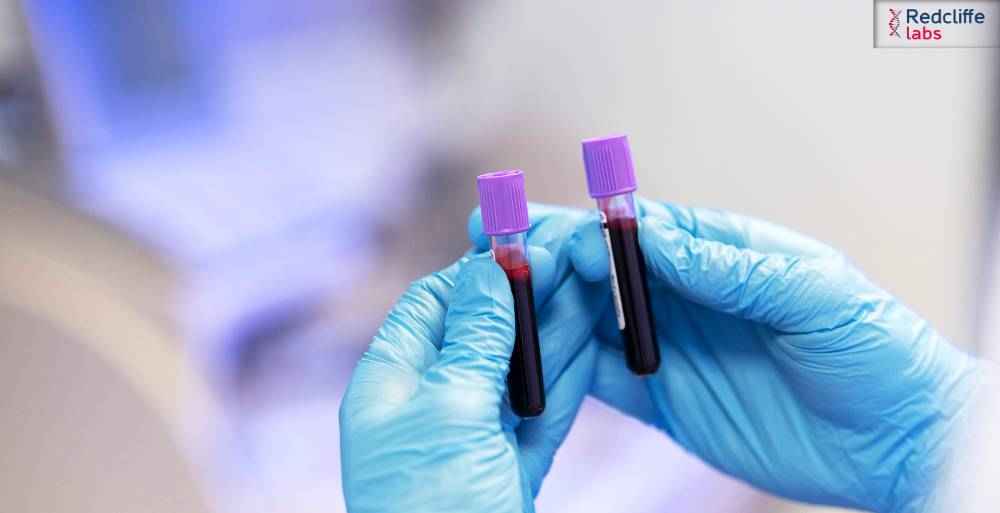MCHC Blood Test - Procedure, Preparation, and More!

Medically Reviewed By
Prof. Ashok Rattan
Written By Sheena Mehta
on Sep 4, 2024
Last Edit Made By Sheena Mehta
on Jul 19, 2025

What is the MCHC test?
Mean Corpuscular Hemoglobin Test (MCHC) is a blood test that measures the average concentration of Hb in red blood cells relative to the cell’s volume. Hemoglobin, also known as Hb, is a protein that primarily carries oxygen throughout the body. Measuring hemoglobin via the MCHC blood test can help detect too high or too low levels of MCHC.
Also known as the RBC indices, the MCHC test can help define various characteristics of RBC. A doctor may suggest an MCHC test to diagnose conditions marked by tiredness, such as anemia. The test also helps monitor other conditions, such as sickle cell anemia, hyperglycemia, hematology, and others.
What is the main purpose of the MCHC blood test?
In simple words, the main purpose of the MCHC blood test is to assess the function and health of red blood cells to check for signs and symptoms of anemia and other blood disorders. The MCHC is a collection of tests that reveal the size, shape, and quality of the RBC.
RBC indices are included in the CBC, which collectively include:
- Mean corpuscular hemoglobin (MCH)
- Mean corpuscular volume (MCV)
- Mean corpuscular hemoglobin concentration (MCHC)
- Red blood cell distribution width (RDW)
Once your CBC test results are in front of your healthcare provider, he will see your MCHC.
What are the common symptoms of the MCHC test?
The common symptoms for an MCHC test or mean corpuscular hemoglobin concentration test are:
- Weakness and fatigue
- Pale skin and gums
- Shortness of breath
- Cold hands or feet
- Dizziness
- Headache
- Lack of concentration
- Chest Pain
- Loss of stamina
- Easy bruising
Do you know?
What is the normal value range for an MCHC blood test, typically between 32 g/dL and 36 g/dL? Let’s explore this in detail.
What are the main causes of low MCHC measurement?
Any value below 32 g/dL indicates low MCHC measurement. This may vary depending on the lab.
The main cause of low MCHC measurement is iron deficiency anemia. Your doctor may prescribe supplements for iron, folate, and vitamin B12 deficiencies. These nutrients are essential for the bone marrow to form healthy red blood cells.
Hypochromia or a low MCHC measurement indicates a lower hemoglobin (Hb) concentration in your RBC. Hence, this reduces your blood’s capacity to transport oxygen to your organs and tissues.
Certain factors are responsible for the iron deficiency anemia. They are as follows:
- Chronic inflammation is long-lasting and makes it difficult for your body to use iron.
- Kidney disease: When kidneys fail to make adequate erythropoietin. It is a hormone that helps make red blood cells.
- Trouble absorbing iron can be genetic, underlying digestive issues, and the effect of endurance sports.
- Thalassemia: Low MCHC can also be due to an inherited blood disorder called thalassemia. A condition in which the body fails to make enough hemoglobin.
- Pancytopenia is a condition characterized by too few red blood cells (RBC), white blood cells (WBC), and platelets.
Other conditions when doctors may prompt you for the low MCHC levels are:
- Heavy menstrual bleeding: If you experience long or heavy periods, it may cause low MCHC levels.
- Celiac disease retards the absorption of nutrients and can trigger symptoms related to anemia.
- Lead poisoning: The main cause of hypochromic microcytic anemia is lead poisoning.
- Thyroid dysfunction, particularly hypothyroidism, can trigger low hemoglobin levels.
What are the main causes of high MCHC blood tests?
Any value beyond 36g/dL indicates a high MCHC measurement.
The high MCHC levels are also due to anemia. However, it depends on which anemia is responsible for the elevated MCHC levels. It could be due to hemolytic anemia developing when the breakdown of the RBC is faster than their replacement. The main causes of hemolytic anemia include:
- Liver disease: People with liver diseases often suffer from anemia. If their liver destroys the red blood cells, it results in high MCHC.
- Sickle cell disease is a genetic disorder that causes the abnormal formation of red blood cells, resulting in sickle cell anemia.
- Lymphoma is a type of blood cancer that produces antibodies. These antibodies target red blood cells, creating a chain response that makes them break or pass on.
- Autoimmune diseases such as lupus can destroy RBC with inflammation.
- Cold agglutinin disease (CAD) is a rare autoimmune disorder in which the body’s immune system attacks red blood cells.
- Vitamin B12 deficiency: Deleting vitamin B12 can lead to pernicious anemia.
How can you prepare for the MCHC blood test?
If your healthcare provider has suggested the MCHC blood test, you should book the appointment immediately.
The MCHC blood test does not require special preparation, but you must avoid alcohol and caffeinated drinks before the test. You should also consult your doctor if you are taking any medicine, as he might ask you to stop taking them before the test to improve the accuracy of MCHC test results.
Besides, there are other things to keep in mind while preparing for the MCHC blood test:
- Hydration: Stay well hydrated before the test. The expert will have more difficulty drawing blood from your vein.
- Fasting: Doctors do not usually recommend fasting for MCHC blood tests. However, depending on your medical condition, ask your healthcare provider if fasting is needed.
- Relaxation: Stay calm during the blood draw. Do inform the healthcare provider about your anxiety or fear of needles, as it can help ensure a smoother experience.
- Clothing: Wear loose or comfortable clothing, as the experts usually draw blood from the inner elbow area.
If you have any doubts or concerns regarding the MCHC blood test, please discuss it with your doctor for accurate test results.
Also read: https://redcliffelabs.com/myhealth/blood-test/average-blood-tests-cost-in-india-complete-price-list/
How is an MCHC test performed?
The MCHC test collects blood through a punctured vein from your arms. Before the expert inserts the needle, he cleans the site with disinfectant and applies a band to make the vein clearly visible. Once he obtains the blood sample, he applies a bandage or cotton gauze to the puncture site to prevent infection and bruising. The blood sample is sent to the dedicated laboratory for analysis and preparation of test reports.
What do MCHC blood test results mean?
One needs to understand that the normal range for MCHC blood test results varies, depending on the laboratory in which the blood sample is analyzed.
|
S. No. |
MCHC Range (g/dL) |
Status |
|
1 |
32-36 |
Normal |
|
2 |
Less than 32 |
Hypochromic or hypochromic anemia |
|
3 |
More than 36 |
Hypochromic or hypochromic anemia |
Book the MCHC test with Redcliffe Labs at an affordable cost!
If your doctor has suggested an MCHC test, you need not delay. Book your appointment for the MCHC blood test with Redcliffe Labs. Download the Redcliffe mobile app or call us directly to fix your slot with us. Get tested with us at a highly affordable MCHC test price.
We also collect blood home samples at home; express slots are available to get your blood sample picked up within 45 minutes, and accurate reports within a given time. So, why wait? Book an MCHC test with us now!
Conclusion
Mean corpuscular hemoglobin concentration, or MCHC, measures the amount of hemoglobin in a single red blood cell (RBC) relative to the cell’s volume. Having low or high red blood cells may indicate anemia, which means your body lacks healthy red blood cells.
The MCHC test is listed among a panel of tests called the RBC indices. If you have symptoms of anemia, a diet low in iron, or a genetic blood disorder, your healthcare provider may suggest CBC as a routine test.
Consult your doctor about the potential high or low reading. He will likely discuss treatment options for your anemia.
Frequently Asked Questions (FAQs): MCHC blood test.
Q. What is an MCHC blood test?
A. A mean corpuscular hemoglobin concentration test is performed to measure the amount of Hb a red blood cell has relative to the cell’s size.
Q. Should I worry if I have low MCHC test results?
A. A low MCHC level may indicate iron deficiency anemia. It may also be a sign of other underlying conditions like celiac disease or cancer. You should seek immediate medical help to get the most appropriate treatment.
Q. What if my MCHC levels are high?
The normal range of MCHC is between 32 g/dL and 38 g/dL. Any value beyond 38 g/dL is considered high. It may be due to anemia, liver disease, or an overactive thyroid.
Q. What are the risks involved with the MCHC blood test?
A. The MCHC test is safe and involves minimal risk. The few minor risks associated with the MCHC blood test are:
- Pain and bruising at the puncture site
- Infection
- Fainting
However, you need not worry. You should inform your healthcare provider about it so that he will be more careful when drawing blood.



